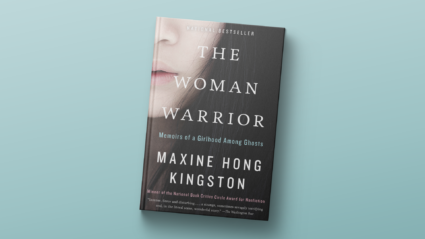Our August pick for the PBS NewsHour-New York Times book club is Maxine Hong Kingston's 1976 memoir "The Woman Warrior." Become a member of the Now Read This book club by joining our Facebook group, or by signing up to our newsletter. Learn more about the book club here. And submit your questions about "The Woman Warrior" at our Google form.
Below are questions to help guide your discussions as you read the book over the next month. Author Celeste Ng, who chose August's book, will appear on the PBS NewsHour broadcast at the end of the month to take your questions about "The Woman Warrior" and talk about what the book means to her.
Spoiler alert for discussion questions further down.
- "The Woman Warrior" opens with the dramatic story of the "no-name woman," Kingston's deceased aunt who was shamed, and ultimately lost her life, for having a child with a man who wasn't her husband. What do you think Kingston wants us to take away from this story?
- Early on, Kingston asks how Chinese-Americans like herself can separate what is peculiar to her own family's stories vs. what is Chinese. What are some of the other challenges of growing up as a second generation immigrant?
- The original title Kingston chose for this book was "Gold Mountain Stories." What does "Gold Mountain" signify, and why would she have picked that name?
- "Women in the old China do not choose," Kingston writes. What are some of the ways women were oppressed in her parents' and parents' parents' generations? What about her own?
- What role does disgrace and shame play in the book? Where does it come from?
- What do you make of Kingston's mother's "talk stories," which are a mix of folk tales and family lore? Do you believe them? Does it matter?
- Who is Fa Mu Lan? How does Kingston become her, or imagine becoming her?
- How does the urban renewal that tore down her parents' laundry business affect their family?
- Kingston's mother teaches her that all white people are "ghosts." What does she mean by this?
- Why is Kingston's mother, Brave Orchid, so intent on her sister, Moon Orchid, finding her husband in America and demanding more from him?
- The last of the book's five interconnected stories is about speaking and not speaking, and the theme of rebellion. Why do you think Kingston closes the book this way?
- "The Woman Warrior" was written in 1976. How does it remain timely or relevant today? Does it also feel dated?
- Since its publication, "The Woman Warrior" has sparked controversy by Asian American scholars who say it presented a distorted view of Chinese culture in its blending of fiction and fact. What do you make of that critique?
- How was the writing style, and the experience of reading this book, different from other selections in our Now Read This book club?
Support Canvas
Sustain our coverage of culture, arts and literature.

